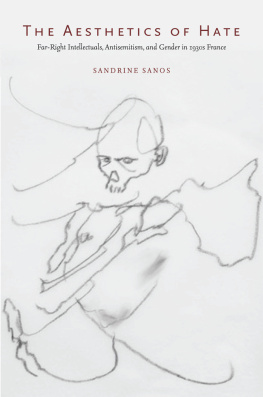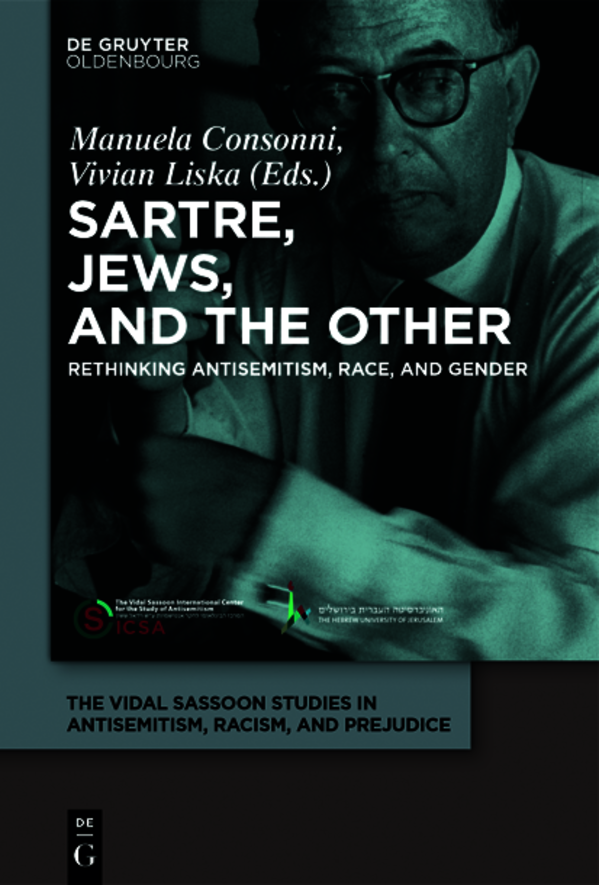The Vidal Sassoon Studies in Antisemitism, Racism, and Prejudice
Edited by
Manuela Consonni
Volume
ISBN 9783110597431
e-ISBN (PDF) 9783110600124
e-ISBN (EPUB) 9783110597615
Bibliographic information published by the Deutsche Nationalbibliothek
The Deutsche Nationalbibliothek lists this publication in the Deutsche Nationalbibliografie; detailed bibliographic data are available on the Internet at http://dnb.dnb.de.
2020 Walter de Gruyter GmbH, Berlin/Boston
Notes
Judith Herman, Trauma and Recovery: The Aftermath of Violence From Domestic Abuse to Political Terror (New York: Basic Books, 1992), 7.
Idem.
Herman, Trauma and Recovery, 9.
Although in German and French the term antisemitism is not hyphenated, standard English usage accepts both antisemitism/ antisemites and anti-Semitism/ anti-Semites. The editors of the present volume have accordingly left the choice of spelling to each individual contributor.
Ethan B. Katz, Lisa Moses Leff, and Maud S. Mandel, Introduction: Engaging Colonial History and Jewish History, in Colonialism and the Jews, ed. Ethan B. Katz et al. (Bloomington: Indiana University Press, 2017), 9.
Stefanie Schler-Springorum, Gender and the Politics of Anti-Semitism, The American Historical Review 123, no. 4 (2018): 1211.
Herman, Trauma and Recovery, 10.
Herman, Trauma and Recovery, 13.
Herman, Trauma and Recovery, 14.
Herman, Trauma and Recovery, 15.
Herman, Trauma and Recovery, 28.
Several political reasons prevented the further development of the hermeneutic field created by the confluence of Sartre's, De Beauvoir's, and Fanon's works. Some of these reasons have been addressed in a recent issue of The American Historical Review focusing on antisemitism. See Schler-Springorum, Gender and the Politics of Anti-Semitism, 12101222; Jonathan Judaken, Introduction, The American Historical Review 123, no. 4 (O2018): 11221138; and Bryan Cheyette, Postcolonialism and the Study of Anti-Semitism, The American Historical Review 123, no. 4 (2018): 12341245.
Introduction: Jean-Paul Sartre's Rflexions sur la question juive
Manuela Consonni
Vivian Liska
Jean-Paul Sartre's Rflexions sur la question juive was first published in Paris by Gallimard in 1946. Contradictory and complex reactions greeted the text upon its release. At first glance, Sartre's small volume seems somewhat superficial, as if written in haste, and nonspecific. Indeed, the Judaeocide of the preceding years is neither explicitly named nor highlighted, although Sartre does refer to the gas chambers in Lublin, a clear metonymic allusion to Majdanek. Finally, one could argue that Sartre a fervent proponent of Enlightenment reason had only an abstract knowledge of Jews, Judaism, and Jewish culture. As such, we can regard his analysis of antisemitism as inadequate. We cannot, however, trivialize this text, which, in both its forceful and absolute denunciation of antisemitism religious, political, and cultural and its affirmation of the right of Jews to be different, represented a moment of rupture in European culture after World War II.
At the time of its publication, the Rflexions was one of the first philosophical engagements with the Holocaust. In a Europe that had been tragically torn apart by the horrors of Nazism and their aftermath, it was especially urgent to engage and interpret the ideology of antisemitism. It was also a time when non-Jews and numerous Jews began to conceptualize Jewish existence in a new way. Sartre's analysis, based on existentialist phenomenology and Marxist hermeneutics, led him to seek the reasons for antisemitism in a cultural or racial bias rather than as the result of the problematic relationship between the ratio and the social reality or, as claimed by the Frankfurt School, as proof of the failure of the Enlightenment at the social and cultural level. Sartre was among the few intellectuals of the time who had the courage to condemn himself and others for indifference, self-interest, conscious collaboration, and vicious prejudice, each of which had nurtured and supported the concise but effective ideology of antisemitism that had led to the extermination of the Jews. He did this in a simple, clear-cut way, via a phenomenological-existentialist analysis, with little attention to history. Undoubtedly, it was a critically important book, especially as, from the outset, it declared that the issue of antisemitism was not a matter of opinion. Sartre's wartime experiences, his participation in the Resistance, and his discovery of historically determined evil compelled the French philosopher to put aside theoretical reflection into matters such as the negative ontology of the subject, the constitutive void in human nature, and the unhappiness of the conscience. He now opted to descend into the contemporary arena in order actively to influence the postwar political and cultural debate. Realizing that he had to abandon his earlier indifference, Sartre now denounced the myths of race, oppression, and racism that had enslaved humanity; he openly advocated autonomy and the rights of the human person. With these acts, he defined with extreme clarity the intellectual's duty towards society.
When Sartre wrote Portrait de l'antismite, in October 1944, during the German occupation of France, he was not yet forty. At the roots of this essay an initial blueprint of the 1946 book were Sartre's indignation and revulsion against the French political class that had dragged France into the shame and horror of the war, in particular the deportation and extermination of so many of the country's citizens, Jews and non-Jews alike. Sartre had previously expressed this hermeneutic of freedom in an article published September 9, 1944 with the significant title La Rpublique du silence. Here, in a polemical tone, Sartre dared to write the word Juif clearly:
Under one pretext or another, as workers, Jews, or political prisoners, we were deported en masse. Everywhere, on billboards, in the newspapers, on the screen, we encountered the revolting and insipid picture of ourselves that our oppressors wanted us to accept. And, because of all this, we were free. [] And this is why the Resistance was a true democracy: for the soldier as for the commander, the same danger, the same forsakenness, the same total responsibility, the same absolute liberty within discipline. Thus, in darkness and in blood, a Republic was established, the strongest of Republics. [] This Republic without institutions, without an army, without police, was something that at each instant every Frenchman had to win and to affirm against Nazism. No one failed in this duty, and now we are on the threshold of another Republic. May this Republic to be set up in broad daylight preserve the austere virtue of that other Republic of Silence and of Night.
Today, more than seventy years after the original publication, Sartre's reflections continue to offer new challenges and points of engagement for the historical and cultural debate related to the Jewish question. The starting point for this volume, therefore, consists of taking into account Sartre's subsequent writings on the subject and rethinking his Rflexions from different perspectives. This approach will aid us in perceiving its different meanings and political functions in a political and historical context marked by postmodern concepts of multi-ethnicity and multiculturalism. In addition to the book's critical impact on the study of antisemitism, Sartre's text also influenced both postcolonial and feminist theories. The heuristic value of Sartre's reflection went beyond the Jewish question. It was adopted specifically as a lodestar in the first systematic elaboration of feminist thought toward radical rebellion. This approach situated the woman vis--vis the Jew. Likewise, Sartre's reflection was influential in the development of postcolonial theory during the process of decolonization. This development addressed the issue of negritude, rejecting it outright, instead addressing questions to those who re-proposed and imposed the justifications for racial hierarchies and separation.








